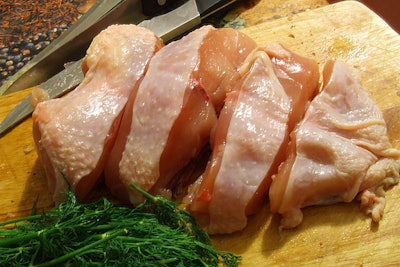
Following the detection of antibiotic-resistant pathogens in chicken meat, two German non-governmental organizations (NGOs) are urging consumers to purchase only organic poultry. They are also calling for a total ban on the use of medically important antibiotics for food producing animals in the European Union (EU).
Just over half of the chicken meat samples tested were contaminated with pathogens showing antimicrobial resistance (AMR), according to a new study.
Describing the results as “alarming” were the two bodies that commissioned the research. These were environmental and consumer protection organization Germanwatch and Doctors against Factory Farming (Ärzte gegen Massentierhaltung). In response to the findings, they called on the European Commission to prohibit the “dangerous use” of the highest priority critically important antibiotics (CIA-HP) in an upcoming review of their future use.
Germanwatch also advised consumers to buy only poultry meat from organic production, or from animals slaughtered on farm. Basis for this recommendation is unclear as the study appears not to have included any samples of chicken from these systems in the analysis.
In the report, all indications of AMR were attributed to the use of antibiotics in the poultry industry.
Results of the study
A total of 165 samples of chicken were purchased from discount stores in five European Union countries (France, Germany, The Netherlands, Poland, and Spain). Selected products came from three of Europe’s largest poultry companies — one German, one French, and one Dutch.
All samples were tested at the National Reference Centre for Gram-negative Hospital Pathogens in Bochum, Germany.
Results of the study reveal that overall, 51% of samples were contaminated with bacteria resistant to one or more antibiotics. Furthermore, 35% of the samples showed resistance to CIA-HPs.
Reactions to the findings
While the pathogens and the degrees of AMR demonstrated varied between the sources, the results concerned the researchers and the study’s commissioners.
“The high resistance rates — especially against CIA-HP — have surprised and shocked us,” said Reinhild Benning of Germanwatch. “Contaminated poultry meat from industrial intensive livestock farming can contribute to increasingly frequent failures of the last effective antibiotics [for human medicine].”
For lead investigator Prof. Sören Gatermann, the high rate of fluoroquinolone resistance, and the detection of methicillin-resistant Staphylococcus aureus (MRSA) were the most surprising findings.
Board member of Doctors against Factory Farming, Dr. Imke Lührs, stressed that physicians depend on CIA-HP for many areas of modern medicine. Based on the findings, she called for effective animal welfare legislation, and a ban on the use of CIA-HP on farms.
Continued decline in veterinary use of antibiotics in Europe
Use of antibiotics in food-producing animals has been in overall decline over the past decade, according to the latest survey by the European Medicines Agency. Between 2011 and 2018, usage fell by almost 35%.
Total amounts of antibiotics (adjusted to allow comparisons) used for food-producing animals in France, Germany, and The Netherlands were all around the median value for the 31 participating countries in 2018. Compared to other classes of antibiotics, sales of CIA-HP for farm animals was low across Europe. For the three countries covered by the study, usage was in line with other states.
In its latest annual report, the European poultry producers’ association, AVEC comments that the European Commission aims to reduce the use of veterinary antibiotics for farm animals by 50% by 2030. While welcoming this ambitious target, AVEC acknowledged that several EU countries have already significantly reduced the use of antibiotics in poultry production.
Earlier this year, it emerged that a growing number of strains of Salmonella and Campylobacter bacteria in the EU have become multi-drug resistant. This was among the conclusions of the annual report on AMR in zoonoses from the European Centre for Disease Prevention and Control and the European Food Safety Authority.
















